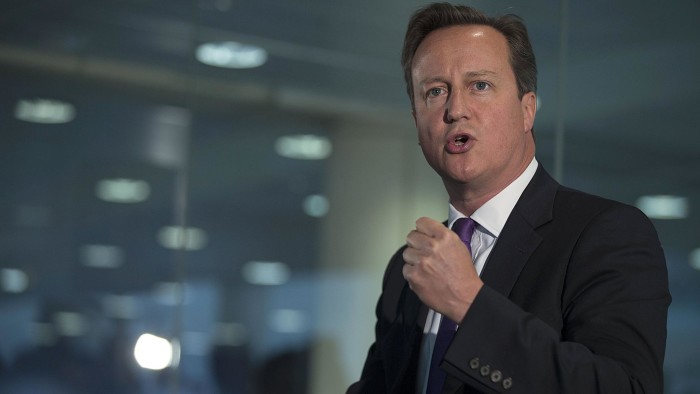Blame game begins as PM makes his final pitch for No vote

Roula Khalaf, Editor of the FT, selects her favourite stories in this weekly newsletter.
David Cameron has made a final appeal to Scots to vote No and avoid a “painful divorce” amid claims that he and his inner circle were slow to heed warnings from senior civil servants that the UK could be heading for a break-up.
His second visit to Scotland in a week reflects an abrupt change of approach following the narrowing of the polls that electrified the campaign 10 days ago. In a foretaste of the recriminations should Scotland vote Yes, a government aide insisted ministers had at no stage taken victory in Thursday’s independence referendum for granted. Any such suggestion was “absolutely complete and utter nonsense”, the aide said.
Meanwhile Mr Cameron, Labour leader Ed Miliband and Liberal Democrat leader Nick Clegg signed a joint pledge in the Daily Record saying that the Scottish parliament was “permanent” and that the so-called Barnett formula – which gives Scotland higher per capita funding for public services than England – would continue.
Lord O’Donnell, cabinet secretary and head of the civil service until the end of 2011, and his successor, Sir Jeremy Heywood, are understood to have raised early concerns over the potential break-up of the union. Other senior civil servants also expressed concern this year that ministers were underestimating the resilience of the Yes campaign, the Financial Times understands.
In the opening months of the campaign, Sir Jeremy, who became cabinet secretary in 2012, pressed ministers to push to win over putative Yes voters, rather than simply shoring up the No vote, according to one person familiar with the discussions. Sir Jeremy had pointed out that winning the independence vote was Scottish first minister Alex Salmond’s sole focus and that Westminster, despite its much wider range of priorities, must provide matching fire, the former insider said.
The Cabinet Office said last night this was “simply not true”, adding that the government’s focus had been “entirely on getting to the right outcome. Ministers and the civil service have worked hard to make the case for the UK”. Their efforts had included 14 analysis papers, as well as “numerous” speeches on, and visits to, Scotland by minsters.
George Osborne, the chancellor, was a key supporter of the “fear” aspects of the campaign – notably on the currency question – in recent months, arguing that a No campaign was by definition destined to be negative.
Michael Moore, Scotland secretary until late last year, defended the conduct of the No campaign. “As long as I was involved, everybody shared and discussed information together and there was a strong consensus between politicians and officials about how this should be approached,” he said. “I’m surprised to hear these noises-off now.”
A coalition figure added: “Politicians if anything understood the dynamics of electoral campaigns rather more closely than civil servants and tend to understand the variability rather better.”
On his final campaign visit to Scotland before the vote, Mr Cameron pleaded with Scots not to think of a Yes as “a trial separation” but as a permanent settlement. “Do not break this family apart.”
Comments